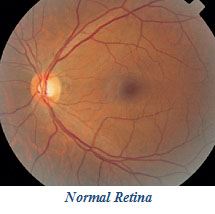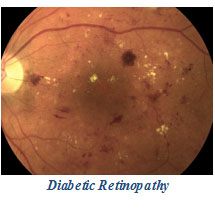Chronically high blood sugar from diabetes can cause blood vessels that supply the retina with oxygen to leak and swell, leading to damage. Diabetes can also cause blood vessels in the retina to close, leading to the growth of new abnormal blood vessels. This can cause bleeding and scar tissue and subsequent vision loss.
Some patients may have completely normal vision despite experiencing severe damage to the retina. Without proper examinations and treatment, patients can go blind quickly sometimes with little or no warning. With proper treatments, we have an 88% chance of preventing blindness from diabetes.
Symptoms of Diabetic Retinopathy
It is uncommon for patients with diabetic retinopathy to experience symptoms in the early stages. This is why it is important to have regular vision screenings. Unlike other disorders to the eye, patients will likely experience symptoms in both eyes. As the condition progresses, symptoms might include:
- Floaters (small flecks) in your vision
- Blurred vision
- Fluctuating vision
- Dark areas in your vision
- Vision loss
- Weakening color perception
Causes of Diabetic Retinopathy
Diabetic retinopathy occurs when a patient’s blood sugar stays persistently elevated. This damages the vessels that nourish the retina. As more and more blood vessels are damaged, the blood supply to the retina is cut off. The eye then attempts to grow new blood vessels but these vessels do not develop properly, causing leaks or bleeds that result in decreased vision and blindness.
Diabetic Retinopathy Treatments
There is no cure for diabetic retinopathy, but several different treatments can help slow the process. Controlling the patient’s blood sugar levels with proper diet and exercise helps control the progression of the disease. In early stages, injections of medicine into the eye or laser treatment can be used to stop leaks of blood and fluid in the retina. If a significant amount of blood leaks into the vitreous gel (the liquid in the eye) a procedure called vitrectomy may be performed to remove it.
Treatment for diabetic retinopathy is often very effective in preventing or delaying vision loss, but it is important to remember that it is not a cure. In some cases, special low vision devices such as telescopic or microscopic lenses can be prescribed to assist with or enhance the patient’s remaining vision.


